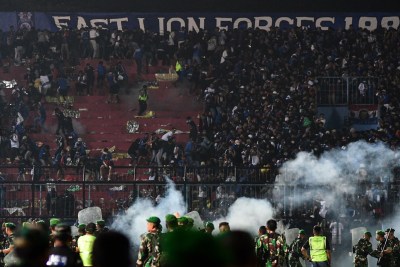JAKARTA – When sports and politics collide, there is always a loser. In this latest case, it is football-mad Indonesia, which lost the right to host the forthcoming International Federation of Association Football’s (FIFA) Under-20 World Cup this week after the ruling Indonesian Democrat Party for Struggle (PDI-P) sought to ban Israel from the tournament.
Although their relationship has always been testy, the controversy appears to reveal an open split between President Joko Widodo and PDI-P chairman and former president Megawati Sukarnoputri only 11 months from next year’s presidential and legislative elections.
The pair had last met at the Bogor palace on March 18 to discuss preparations for the February elections, presumably focused to some extent on Megawati’s choice of a presidential candidate, a decision she is not expected to announce until at least June.
Megawati loyalists based their argument for Israel’s expulsion on Indonesia’s stand against colonialism – and Israel’s illegal occupation of Palestine – which is embodied in the 1945 Constitution and remains a key part of the foreign policy laid out by her father, founding president Sukarno.
“Strengthening our ideology (Pancasila) is very important,” PDI-P secretary-general Hasto Kristiyanto, one of Megawati’s closest retainers, said in a statement. “Don’t, for example, compromise our ideology for the sake of the market.”
Kristiyanto accused FIFA of applying double standards, pointing out that it had ignored Israeli violence against Palestinians while banning the Russian football team from the World Cup playoffs in Qatar over the February 2022 Ukraine invasion.
Central Java Governor Ganjar Pranowo, who tops the presidential polls and has Widodo’s support, surprisingly came out in favor of banning Israel as well, saying it was to conform with Sukarno’s mandate to continue pushing for Palestinian independence.

Despite Indonesia’s assurances, Coordinating Minister for Human Development and Culture Muhadjir Effendy disclosed that FIFA had rejected “certain conditions” Jakarta had recently sought to impose regarding Israel’s participation.
Insisting that the tournament should go ahead, Widodo made it clear that Israel’s participation would in no way change Indonesia’s “solid and strong” support for Palestine as an independent state.
Although Palestinian Ambassador Zuhaier Al Shun said he had no objections to Israel’s involvement, PDI-P leaders maintained their opposition, forcing Widodo to dispatch Soccer Association of Indonesia chairman (PSSI) Erick Thohir on a vain rescue mission to FIFA’s Zurich headquarters.
Within hours of his meeting with FIFA president Gianni Infantino, the governing body announced on its website that it had stripped Indonesia of hosting rights “due to the current circumstances,” without giving the actual reason for its action.
Sanctions could well follow, but FIFA added: “Despite this decision it remains committed to actively assisting PSSI, in close co-operation and with the support of the government in the transformation process of Indonesian football following the tragedy that occurred in October 2022.”
That was a reference to the riot and subsequent stampede which broke out at a soccer match at Kanjuruhan in the East Java city of Malang last October that left 135 fans dead in one of the world’s worst sporting tragedies.

Last week, the Surabaya District Court acquitted three policemen of causing the mayhem by firing teargas into the crowded stands. A senior police officer, a match organizer and a security official were previously sentenced to 18 months imprisonment for negligence.
A FIFA team has since been in Indonesia advising PSSI on how to improve stadium safety because, as Infantino noted, “Indonesians love football and we owe it to them that when they go to see matches, they are safe and secure.”
Earlier this week, FIFA postponed holding the draw for the tournament after Bali Governor I Wayan Koster, who said he was acting on instructions, questioned why the Israelis were competing in the prestigious event when it did not have diplomatic relations with Indonesia.
“We request the minister adopt a policy forbidding the Israeli team from competing in Bali,” the former PDI-P legislator wrote in a letter to the Youth and Sports Ministry dated March 14 but only made public six days later.
Bali’s 18,000-seat Kapten I Wayan Dipta Stadium was to be one of the six venues for the long-awaited May 20-June 11, 2023 tournament, along with Palembang in South Sumatra, Jakarta, Bandung, Surabaya and Solo, Widodo’s hometown.
Up until then, football officials had turned a blind eye to the issue, apparently after reassuring FIFA that politics would not be a problem when it was awarded the hosting rights in 2019.
But that was long before Israel qualified as one of the 24 teams from six confederations who will compete in the tournament, which had already been postponed from 2021 due to the Covid-19 pandemic.
It was to be a first for both countries. Israel has never taken part in the Under-20 competition before and Indonesia has never hosted a FIFA event, one that millions of Indonesians were keenly looking forward to.

As host, Indonesia was the one team which qualified automatically, another first that would otherwise be difficult to accomplish against Asian football powerhouses like South Korea and Japan.
Apart from the principle involved, PDI-P may have calculated that its stance would win support from a wider range of Muslim voters. But it also runs the risk of angering diehard soccer fans, many of them younger people unhappy at the way politics has intruded into their sport.
Under-40s account for 56% of Indonesia’s 192 million-strong voting population and often have very different views from their peers and the Jakarta political elite.
“Struggling for the independence of another nation, you all destroyed the dreams of the children of your own nation,” 18-year-old Under-20 Indonesian striker Hokky Caraka said in a heart-wrenching social media post. “Sweet dreams friends until we meet again.”

